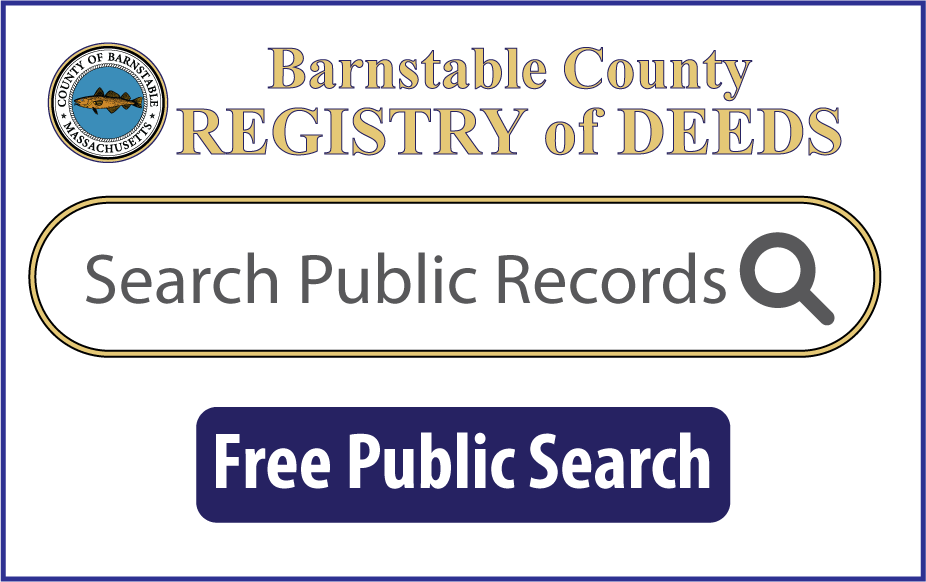The Barnstable Registry of Deeds in an “office of record.” That means we accept documents for recording that meet the minimal legal requirements for recording as set out in the Massachusetts General Laws, the rules of the Land Court (for registered land documents) and the rules of the Barnstable Registry, all as interpreted by the Register of Deeds. Documents are placed on “record” at the appropriate Registry of Deeds in order to be valid against and give notice to any persons who have an interest in the property affected by the document. Recording a document at the appropriate Registry of Deeds puts the “world on notice” of that document.
Essentially, a Registry of Deeds is a “library” of recordings. The person presenting the document for recording assumes the status of author and the Registry Staff are the librarians who catalog it and put it on the shelf. Just as with a library, the Registry does not act as an editor or “ghost-writer” for the “author.”
With that preamble, the answer to the question posed above is as follows: Aside from examining a document to see if it meets the minimal legal requirements for recording, the Registry Staff is prohibited by law from giving “legal advice” concerning the document. The prohibition against giving “legal advice” includes a prohibition against advising or offering opinions on matters such as:
- How to prepare a document;
- Whether a “recordable document is otherwise legally correct, or if it will “do” what the “author” is hoping it will do;
- The order documents should be placed on record;
- Whether an individual has “good” or “clear” title;
- Whether a mortgage or lien has been effectively discharged; and
- Whether an individual should or should not record an otherwise legally recordable document.
Our advice to anyone who has any of the above questions or issues is to consult with an attorney. Documents that are accepted for recording at a Registry become permanent public records and are not alterable once they are accepted for recording. The likelihood that the document you are recording will affect your most valuable asset, your home, should give you pause before recording anything you have not previously run past your attorney.
We want to help you in any way we legally can in your dealings with the Barnstable Registry of Deeds, so please do not hesitate to ask us questions if you have any. Please understand, however, that if your question calls on us to give you “legal advice,” as we define the term, we may not be able to be as much help to you as you may hope or expect. Thank you.
You may obtain a copy of your deed by either 1) coming to the Registry, 2) sending in a mail request, or, 3) using our credit card charge CAPEVIEW internet based option.
To obtain a copy of your deed via mail please send $3.00 and a self-addressed stamped envelope together with the book and page reference or document number reference of the deed you are looking for to P.O. Box 368, Barnstable, MA 02630. If you do not know the title reference, please list the owners name, street address and town where the property is located. Do not forget to note your return address on your request. All requests for copies must be prepaid.
Please note: All copy orders must be accompanied with a self-addressed stamped envelope with sufficient postage to handle your request. Any order without sufficient postage will not be processed.
To obtain a copy of your deed or other document via the web please click on the CAPEVIEW link and follow the instructions for credit card printing.
Please be advised that the Registry of Deeds cannot do a title search for you. If you are looking to research a title or need copies of more than just your deed and you are unsure of how to search a title you can contact an independent title examiner. There are many people who make their living doing title examinations. A list of individuals and firms that provide title examination services can be found by clicking on the Title Examiners link.
If your discharge refers to a book and page number (Recorded Land) the recording fee will be $105.00. Any Recorded Land instrument sent for recording via mail or express service must include a self-addressed stamped envelope (SASE) in order to have the instrument returned to you. Any Instrument without an appropriate SASE will be discarded within five business days of recording. If the discharge does not already refer to the street address of the property being discharged you should write the street address and the town in the left-hand margin of the discharge.
If your discharge refers to a six (6) or seven (7) digit document number (Registered Land/Land Court) the recording fee will be $105.00. Any Land Court document sent for recording via mail or express service must include a self-addressed stamped envelope (SASE) in order to have the document returned to you. Any Instrument without an appropriate SASE will be discarded within five business days of recording. If the discharge does not already refer to the street address of the property being discharged you should write the street address and the town in the left-hand margin of the discharge. Please note that if your mortgage was noted on more than one certificate of title the fee will be $105.00 for each certificate.
In rare cases your property may be what we call “both ways” meaning it is both Recorded & Registered Land (Land Court). If your property has both a book and page reference and a Land Court Reference the fee will be $210.


 Search Barnstable County recorded land indexes and images from 1704 to the present here on our website.
Search Barnstable County recorded land indexes and images from 1704 to the present here on our website.